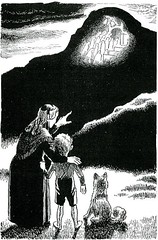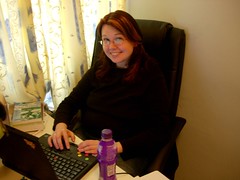The Icelandic view ... (an excerpt from my MA thesis)
Icelandic societal structure underwent profound changes in the twentieth century, as it was drawn from the pre-industrial age to a modern, technologically advanced society. It remains a mixed culture, openly professing Christianity yet maintaining a number of older, earth-based beliefs. Previously a country under the colonial power of Denmark, the Second World War brought traumatic change as well as national independence. The population moved from a society based on rural individual farmsteads, through a radical shift in its economic base to fishing centres and towns, to a sophisticated modern technology-based way of life in a span of mere hundred years.
 Belief in elemental beings is openly professed, with most families being able to tell a tale or two regarding interaction with the hidden people. Seeing relatives that have passed away is also for most an accepted occurrence, and treated as a natural part of life. William H. Swathos has argued that, although not doctrinal, Icelanders are intrinsically religious, but due to how secluded Icelandic farmsteads used to be, a different approach to religion arose, focused more on personal interpretation and the home rather than mass meetings, which would have been generally impossible to arrange.
Belief in elemental beings is openly professed, with most families being able to tell a tale or two regarding interaction with the hidden people. Seeing relatives that have passed away is also for most an accepted occurrence, and treated as a natural part of life. William H. Swathos has argued that, although not doctrinal, Icelanders are intrinsically religious, but due to how secluded Icelandic farmsteads used to be, a different approach to religion arose, focused more on personal interpretation and the home rather than mass meetings, which would have been generally impossible to arrange. There has been some decline over the past few decades in these beliefs, or rather, there has been an adaptation to the modern world and the information it has brought with it. Stuart Vyse, in discussing the decline of magical thought in general, seconds this:
‘waning influence of the supernatural occurred at a time of rapid scientific and technological development. ... In addition, improvements in communication reduced the isolation of small communities and improved access to information.’
A well documented and publicized case is when a road in process was diverted due its path crossing a well known álfasteinn, a rock believed to be home to the hidden people. A case re-opened in a New York Times article this summer on the superstitious beliefs of Icelanders, with Hildur Hákonardóttir, former museum director, quoted as saying; ‘If you ask an Icelander whether he believes in elves, they will say yes and no’. Many such cases exist, and are exemplified in the attitude expressed by Jón Jónson (an obvious pseudonym), an Icelandic scientist who in his younger daysused to work as a civil engineering surveyor: ‘I don’t know if they exist or not, I’ve never seen anything, but I’d rather not take my chances’. He goes on to say
‘Back in 1967, whilst Búrfellsvirkjun (Búrfell Hydroelectric power scheme) was being built, we were digging an approach canal through a deep field of pumice. At one point, just outside the profile of the canal, about a metre outside, there was this great big boulder, probably about ten metres in diameters, smooth, one suspects it was a glacial erratic. The Resident Engineer’s team had a North American engineer, and he didn’t like the position of this boulder so close to the canal profile, and wanted it removed. The Icelandic engineers came in and firmly said no, “You don’t trouble them unless you have to”! They weren’t saying that there were huldufólk [hidden people], but they saw no reason to take a chance on there being huldufólk. It is just part of the Icelandic ethos. Icelanders have had to live so close to raw nature and to be so self sufficient that they have that particular attitude, and the power of nature in the form of glaciers, earthquakes, volcanoes is all a natural part of the background. All a part of wishing to give some sort of humanisation to natural overwhelming events.’
Icelandic society is still a country where folklore is markedly thriving in a high-tech environment, a country of contradictions, and hence the news story below makes perfect sense...At least to me ;-)

2 Comments:
So, do you believe in elves?
I found this absolutely fascinating. When I visited Iceland in 2000, I had an odd feeling that I was in a place that had a mysterious quality about it. I never shook this feeling and have wanted to return every since.
Now it really sounds like my kind of place!
Yes, how true indeed. When can I read the rest of you thesis ?
Post a Comment
<< Home